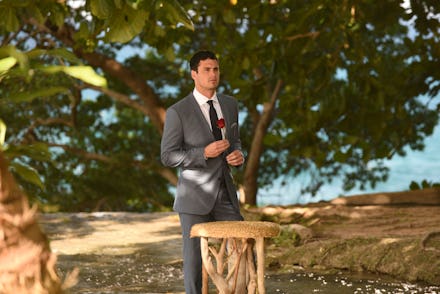Sorry, Bachelor Ben Higgins, You Don't Actually Need a Dad's Permission to Propose

When the producers at ABC concocted their preview for Monday night's Bachelor finale, they included a clip of Ben Higgins making a last-minute call on his iPhone before proposing. The implication, based on the heavily edited clip, was that he had changed his mind about the proposal and was calling the recently rejected woman back.
But as it turns out, he was doing something a lot more traditional: He was asking for the finalist's hand in marriage.
Ben, the ever-respectful, upstanding bachelor, called finalist Lauren Bushnell's father to declare his love for his daughter and ask for her "hand in marriage." Her father happily gave it, prompting Ben to execute an awkwardly adorable fist pump that you couldn't help but smile at.
It was, without a doubt, a cute moment. But for a show that dwells in the ambiguous space between the progressiveness of modern dating and conservative tradition, it was also a moment that reminded us just how old-school the values of The Bachelor really are. Asking a father's (and not even the mother's) permission for his daughter's hand is but one of the many long-standing marital traditions steeped in inequality and gender norms that our modern society — including The Bachelor — cannot, or will not, shake.
For American brides and grooms, asking for a woman's hand in marriage dates back to colonial times, a tradition brought over from England when marriage was still more about property and alliances than love.
"It was a fairly common practice based on the notion of making alliances between families and passing the daughter who was legally the property of the father onto the husband," Temple University historian Beth Bailey told the Boston Globe.
By the mid-1800s, the tradition of a man asking the bride's father for permission was becoming less and less important, seen more as a pointless formality. The 1948 edition of Vogue's Book of Etiquette reportedly observed, "The custom today is that the two principals make up their minds first, and the bride tells her parents about the engagement afterward," based on the new standard of "love matches."
Yet somehow, the tradition has tenaciously stuck around, along with several other old-school, highly gendered marriage traditions, from engagement rings to the male-led proposal.
"What we're seeing right now is an odd combination of young people with progressive sentiments and a real desire for conventional gender roles and arrangements," Bailey said.
That "odd combination" is at the heart of the twisted, arguably sexist television concept that is The Bachelor. The show has always embraced a "selectively Victorian sensibility," as Slate's Willa Paskin wrote. That sensibility falls by the wayside when hot tubs, fantasy suites and bikinis are up for grabs, but kicks in hard when questions of proposals and family come into play.
As for engagements, The Bachelor approaches them as traditionally as possible: The man picks out a large diamond ring, he awaits his future bride, she presents herself before him and he gets down on one knee. Even on The Bachelorette, where the woman is ostensibly in the driver's seat, the chosen man still gets down on one knee, ultimately taking control of the proposal.
When it comes to asking for a father's blessing or permission, The Bachelor doesn't have any set rules. But several men have done it, often on the "hometown dates" before the bachelor even chooses the finalist, as Sean Lowe did. And Ben did it on Monday night, when he called Lauren's father and asked for her hand in marriage.
There is, notably, a difference between asking a father for "permission" versus asking "for a blessing." "Blessing implicitly acknowledges everybody's autonomy, and permission evokes ideas of the prospective fiancée as property and of a bride price payable in goats," according to Slate.
Ben used the "hand in marriage" line, which may come from the tradition of handfasting or hand-tying found in various cultures, including Celtic Scotland and Ireland.
Ben did, however, invoke another gendered tradition: asking the father, and notably not the mother, in keeping with the age-old tradition of fathers guarding their daughters' purity and fate. The tradition not only reaffirms a daughter as property — or at least the weaker sex in need of protection — but also the father's total control over the family.
In true Bachelor fashion, however, the highly gendered, arguably sexist moment was easily overlooked in favor of pure, unabashed, enjoyable romance. There are plenty of people out there — including many women, apparently — who find the gesture charming in an old-school way:
The brief moment, played out over the most modern of devices, was a two-fold reminder:
When it comes to marital traditions, sometimes the ones we have the most affection for — and find the most romance in — are the oldest ones. And watching these traditions play out on TV, swallowing our feelings of slight discomfort in favor of heavy swooning, is itself becoming a new tradition.